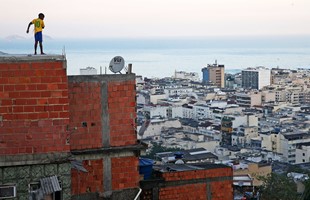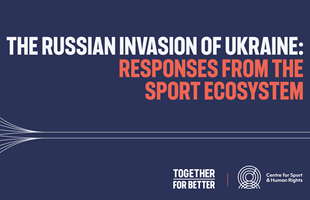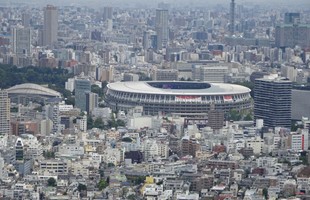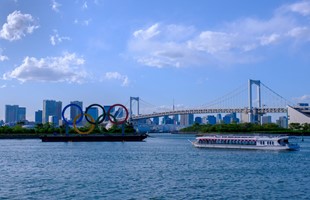Case Study: Managing Acts of Discrimination and Activism at Mega-Sporting Events
03 Dec 2021
Author - Centre for Sport and Human Rights
Background
Sport has faced many examples of discriminatory behaviour – from racist remarks being called out by fans to homophobia on the field of play. At the same time, sport and sporting events more broadly are increasingly being used by activists as a platform for raising awareness about issues that are sometimes linked to the event itself, and sometimes linked to wider societal concerns. This has been seen through protests in Bahrain for example ahead of the Formula One Grand Prix, in Brazil ahead of the Olympics and in many other jurisdictions, including Australia. While no human right is more important than the others, event hosts can sometimes feel they are having to balance different rights, including anti-discrimination with respect for freedom of expression and of association.
Key rights to consider
It is important to understand what constitutes discrimination and under what circumstances, if any, freedom of expression can be restricted to safeguard against discrimination. Furthermore, many groups or individuals choose to express their right to freedom of expression through peaceful assembly and the right to freedom of association. All of these rights must therefore be understood in the context of MSEs. These rights are protected under the International Bill of Rights[1] which has been ratified by the government of Japan since 1979.
Right to non-discrimination
Non-discrimination is a fundamental and overarching human rights principle. It typically refers to the fact that all people are born free and equal in dignity and rights and that individuals – regardless of race, color, ethnicity, ancestry, national origin, sex, gender, gender identity, sexual orientation, age, mental health, disability, religious beliefs, marital status, genetic information, pregnancy, veteran status, citizenship, or any other status that may or may not be protected by law or local policies - should be entitled to the protection and respect of all their human rights. These rights include for example the rights to leisure, and to equal access to freely participate in cultural life, such as through sporting events.
Right to freedom of expression
The right to freedom of expression is spelled out in Article 19 of the Universal Declaration of Human Rights which states that everyone has the right to freedom of expression and opinion. However, questions exist on what should happen if one persons opinion or expression defames or offends another person such as in the case of hate speech. Article 19 of the International Covenant on Civil and Political Rights (ICCPR) offers some explanation. It states that with the right to freedom of expression comes with certain responsibilities, including the need to respect the rights of others, and not to undermine national security or public order. Article 20 of the ICCPR goes further and prohibits “hate speech” which is speech that vilifies people and incites racial, religious or national hatred.
Right to freedom of assembly and freedom of association
The rights to freedom of assembly and freedom of association outline the right of people to gather collectively to pursue a common interest or to express a common view. The rights to freedom of association and freedom of assembly are often grouped with the right to freedom of expression as the right to express oneself is often a pre-requisite for allowing people to come together as a group.
These rights in the context of MSEs
There are several examples of where international organisations, and indeed sport federations, have restricted some acts of free expression to uphold their commitment to anti-discrimination. Below are a series of examples from different sport federations and event organisers which outline their policies on certain topics, and how they have balanced anti-discrimination with freedom of expression, including the rights to freedom of association and assembly.
Examples from sport federations / event organisers
FIFA – Gender discrimination
On gender discrimination, FIFA states in Article 4 of its Statutes that “discrimination of any kind…is strictly prohibited and punishable by suspension or expulsion”. FIFA has also gone beyond their Statutes on several occasions by stating that women should be actively encouraged to be part of the game – as players, spectators and administrators.
There are some examples of where FIFA has taken a stance against discrimination but in favour of a social cause. For instance:
- Action against discriminatory behaviour: FIFA has partnered with the FARE Network to define a series of offensive words and language that could constitute sexism and homophobia and clearly outlines these as discriminatory in the Global Guide to Discriminatory Practices in Football. Fans or anyone using this language could therefore be punished depending on the level of offence. TOCOG has used this guide as the basis for understanding offensive language in its own anti-discrimination training materials.
- Action in favour of a social justice cause: FIFA had been criticised for complying with certain countries’ discriminatory legislation on not allowing women as fans into stadiums, such as in Iran. FIFA took a stand by allowing a small number of women to participate as spectators, and to allow banners and slogans into the stadiums supporting the call for more equal access.
UEFA – Combatting racism
Racial discrimination and racial slurs have long been an issue in sport, particularly in the sport of football. UEFA has done significant work on this matter, including through its ‘Say No To Racism’ campaign. This campaign allows teams in club competitions to wear armbands saying no to racism and to play messages in stadiums for fans. It has also resulted in some matches being paused to deal with racist incidents or stopped altogether to ensure a respectful playing environment.
Some specific examples of their stance against racism have included:
- Action against discriminatory behaviour: In October 2019, a Euro 2020 qualifier match between England and Bulgaria was paused twice to deal with racist remarks shouted by Bulgarian fans. After an investigation UEFA took the decision to sanction the Bulgarian Football Association, requiring the national team to play their next competitive game behind closed doors and to pay a €75,000 fine.
- Action in favour of social justice cause: Following a number of global protests in Summer 2020 calling for racial justice, specifically in support of the Black Lives Matter protest, UEFA, along with FIFA, urged National Football Associations not to sanction teams and players who chose to take the knee – a move that until recently, had brought controversy in sport
National Basketball Association (NBA) – Athletes’ freedom of expression
Athletes are increasingly speaking out about social justice causes that are important to them. There are many examples of where athletes have chosen to take a stand on the podium or the field of play. One such example has been in the context of the NBA in the United States. At the start of the 2020 season, many players refused to play due to the ongoing fight for racial justice in the United States citing the fact that they did not feel comfortable simply playing as if nothing was wrong. After talks with the league, the season became a platform for promoting racial justice messages.
Some specific examples of the leagues’ stance have included:
- Action against discriminatory behaviour: An investigation is currently underway into one player on Miami Heat who used an anti-Semitic expression. The League is currently debating what punishment or sanction should be put in place, but could include a one-game suspension and/or USD 50,000 fine.
- Action in favour of a social justice cause: Ahead of the restart of the 2019/2020 which was postponed due to the Covid-19 pandemic, NBA players agreed with the League that they would wear jerseys and masks branded with the words Black Lives Matter and other pre-approved slogans to raise awareness about the movement. The NBA also painted the words on the court.
Commonwealth Sport – Engaging local communities
Ahead of the 2018 Commonwealth Games in Gold Coast, Australia, local indigenous communities felt the need to protest to push for a truth and reconciliation commission around the country’s treatment of aboriginal and First Nations people. The Commonwealth Games Federation collaborated with local communities to address concerns and to use the platform of the Games as an occasion to amplify acknowledgement and respect, protect people, promote cultural diversity and empower communities with meaningful engagement and employment opportunities for aboriginal and first nations people.
Some specific examples of how Gold Coast Organsing Committee (GoldOC) managed this issue included:
- Action against discriminatory behaviour: There was some backlash to the Opening Ceremony of the Gold Coast 2018 Commonwealth Games for being too heavily focused on Australia’s indigenous culture and population. The organisers decided not to take any action and to let it be a thought-provoking conversation.
- Action in favour of social justice cause: The Commonwealth Games organisers planned from the beginning to organise the event to recognise, respect and celebrate the Aboriginal and Torres Straight Islander peoples and cultures. A Reconciliation Action Plan was therefore developed before the event which focused on procurement opportunities for indigenous businesses, increased employment and training opportunities for aboriginal people, increased participation from these communities, increased awareness of the Aboriginal and Torres Straight Islander languages and culture, and improved connections with the community. This got ahead of an issue that had caused controversy and protests at previous iterations of the Commonwealth Games in Australia.
Suggested best practice
There are many examples of sport and sporting events managing to find a balance between ensuring freedom of expression, whilst protecting individuals’ right to non-discrimination.
Below is a list of overarching best practices that event organisers should consider having in place:
BEFORE the event:
- Map the contextual risks and opportunities presented by the host city / nation in terms of local and geopolitical issues that might impact people’s freedoms, fair treatment, equality and justice.
- Offer and clearly communicate policies and processes for conducting advocacy or activism, and encourage such demonstrations to take place in designated areas around the main event venue or fan zones – e.g. through means such as by wearing armbands or t-shirts rather than within the main stadium(s) or sporting venues themselves.
- Identify and communicate ahead of the event words / images / banners that have been identified as discriminatory. Such lists exist, for example, as defined by FARE. (TOCOG has defined many of these in its anti-discrimination training tool)
- Train stadium stewards, security and other staff on how to identify acts of discrimination and distinguish them from activism. It is recommended that where possible, a risk assessment be conducted in advance of an event to identify any potential for discriminatory behaviour. This assessment could include considering whether there have been any past incidents
- Identify what words / images / banners would be allowed and are in support of a social justice causes and communicate these to staff
- Engage with local communities and other affected groups ahead of the event to understand their concerns and get ahead of any protests that may occur
AT the event:
- Have messaging in the stadium for fans to identify discriminatory behaviour and raise concerns themselves through hotlines and other appropriate channels
- In the event of a discriminatory act, follow procedures and guidelines developed before the event
- In the event of a protest in the middle of an event or on the podium, intervention is discouraged unless highly defamatory – an investigation and possible sanctions or repurcussions should be considered afterwards
[1] This comprises the Universal Declaration of Human Rights, the International Covenant on Civil and Political Rights and the International Covenant on Economic, Social and Cultural Rights.



